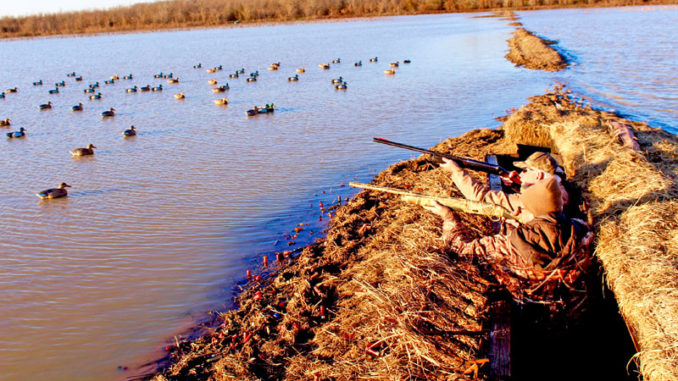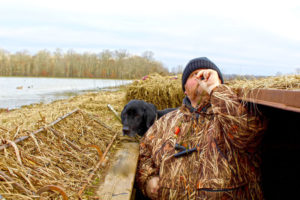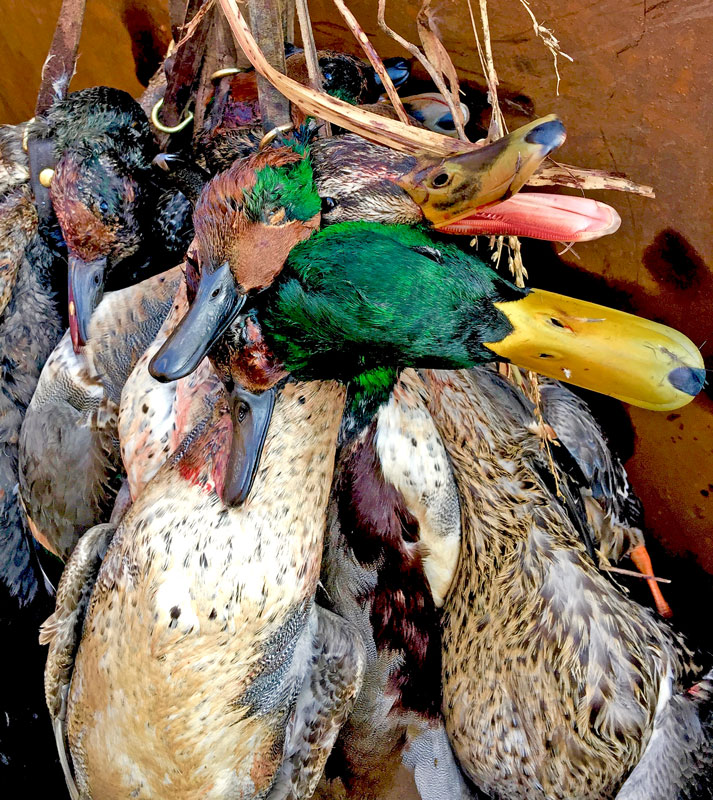
 One side of Charlie Zaunbrecher’s family came from Gueydan, the proclaimed “Duck Capital of America.” The other side came from Stuttgart, Ark., which calls itself the “Duck and Rice Capital of America.”
One side of Charlie Zaunbrecher’s family came from Gueydan, the proclaimed “Duck Capital of America.” The other side came from Stuttgart, Ark., which calls itself the “Duck and Rice Capital of America.”
We will let somebody else sort that out, but the affect of that heredity is obvious on Zaunbrecher. He and his younger brother, Lee, have been told all their lives they were born with duck blood in their veins. They further enhanced that by living in the Jones/Bonita area, just a few miles from the “Nature’s Funnel” of duck hunting in northeast Louisiana.
Growing up on a rice farm, something else got in Zaunbrecher’s blood.
“If you were too young to help out on the farm, you helped cook for the men working the harvest,” he said. “I’ve been in the kitchen when I was way too young to be chopping up onions, bell pepper and garlic with a sharp knife, but that’s how I learned to cook.”
Today, Zaunbrecher does more cooking than hunting, but he still gets in the blind more than most folks. He is the executive chef at the renowned Bartholomew Club in Jones, a community in Morehouse Parish. To call it a “club” is like calling an alligator a lizard. It’s more like a resort, a two-story, antebellum-inspired lodge and 5-star restaurant rolled into one, complete with flooded rice fields and pit blinds for ducks.
“It’s an amazing setup, and we have people who come from all over the country to hunt here, plus our regular members,” he said.
Zaunbrecher pointed out that the area is a natural funnel for ducks coming down the Mississippi River all the way from Canada. When they leave Arkansas, heading south into Louisiana, they gather there because the delta narrows down considerably. The Bartholomew Club’s hunting grounds are on the Arkansas border, adjacent to the 14,000-acre Overflow National Wildlife Refuge, a magnet for ducks.
Funnel and magnet. A hard combination to beat.
“The ducks that leave (there) fly right over us,” he says. “Like any hunting, it isn’t always perfect, because it is wild birds we are after, but I’ve never seen any place consistently better.”

Zaunbrecher has a lifetime of experience duck hunting, spends time with lots of duck guides and learns from hunters who visit the club. He has sound advice for duck hunters.
“One of the hardest things for duck hunters to do is swallow your call,” he said. “I mean, don’t blow it if you don’t need to. You aren’t arguing with the ducks; you are trying to entice them. Second, read and watch all you can about duck hunting. Know what to say and when to say it to the ducks when you are calling. Learn different calls and when to use them.”
Zaunbrecher said to listen to a guide if you hunt with one. They guide for a reason. Never go to the blind without practice, either. And clean your gun. Many a trip has been ruined for a hunter with a dirty gun that malfunctioned.
He suggests finding a call that you are comfortable with and that works. Never be shy to ask good hunters for their help and opinion. They don’t make the old cut-down Olt call that Zaunbrecher loves dearly, but his favorite call now is the Echo, which is almost like the old Olt. You want it deep and raspy. You are calling ducks, not competing in a contest. He doesn’t carry a bunch of calls like some hunters, but he does carry a teal whistle.
“When you are duck hunting with a group, appoint a blind captain,” Zaunbrecher said. “Somebody needs to be in charge. Obviously, on a guided trip, it’s the guide. But on any hunt, somebody needs to be in charge of looking for the ducks where you don’t have five or six heads bobbing up and down out of the blind. He needs to do most of the calling unless he asks for help. And he needs to be the one that calls the shots.”
There is a lot of trial and error in duck hunting. The more you know for different situations, the more consistent you can be. And there is one important tip that hunters can’t forget.
“You have to have the proper amount of snacks in the blind,” Zaunbrecher said.
Coming from an executive chef, you’d maybe expect lox and bagels, ribeye steak biscuits, eggs Benedict? Nope, not even close.
“The preferred blind snack of accomplished waterfowl hunters is well established. It’s Little Debbie Christmas Tree Cakes,” he said. “When they start hitting the shelves, hunters know duck season is around the corner. You have to grab some up. Oatmeal pies and Nutter Butter bars will do in a pinch, but nothing is better with a Thermos of coffee than a Little Debbie Christmas Tree Cake.”
Most duck hunters pursue the sport on their own, but a growing number of waterfowlers take advantage of the guided opportunities like at Bartholomew Club, where all they have to do is enjoy. Either type of hunting is great, but having a couple of days to just get away and enjoy it all without any work is a special treat for hunters.
“Duck hunting is a social sport, and that’s why I love being around the hunting, the cooking, the whole experience,” he said. “It’s so much fun to go out with a group and razz somebody when they miss, work the dog, call the ducks and see the joy on a hunter’s face when a big mallard cups up over the decoys and they nail it. That’s what duck hunting is all about.”

Bartholomew hunters never duck out on dinner
The dining at Morehouse Parish’s Bartholomew Club, according to executive chef Charlie Zaunbrecher, aims for a 5-star experience when guests sit down to a white tablecloth dinner.
“The food, the service, the whole experience is designed to be the best we can make it,” Zaunbrecher said.
The club has a varied menu, but a favorite is seared duck breast appetizers, beef tender with crabmeat topping, smashed potatoes and grilled asparagus.
Here’s how he prepares the meal:
Duck breast
“Being at a duck camp, we always have plenty of fresh duck breasts,” he said. “I like to clean the breasts and let them soak in ice water two or three hours to remove any impurities. I marinate them in soy sauce, rice wine vinegar, honey and a little bit of sesame oil with a few flakes of red pepper. When it’s time to eat, I put the whole duck breast on the griddle, as hot as I can get it, and sear them about two or three minutes on each side. The honey helps it caramelize quickly. I let it rest a few minutes, then slice it and serve.”
Beef tender
“I clean the tenderloin to remove all the silverskin, sinew and excess fat,” Zaunbrecher said. “Then, I cut the tenderloin into steaks and season it with salt and pepper. Cutting it into steaks ensures each one cooks and tastes the same, plus, with a crowd, it lets me manage portions.
“I seal the steaks in a bag and submerge it in the Sous vide at 120 degrees for an hour-and-a-half. Sous vide, which means ‘under vacuum’ in French, is vacuum-sealing food in a bag, then cooking it to a very precise temperature in a water bath. When I take it out, I make sure it is totally dry, then sear it on the hot grill one minute on each side. It’s important to let it sit 7 to 10 minutes before serving so all the juices will reabsorb into the meat. When you cook it this way, every steak is the same: medium rare from top to bottom, whether you cook 10 or 40.
“I clean the crab meat and lightly warm it in butter with a dash of salt and pepper and place a generous portion on top of the tender.”
The accompaniments
“Smashed red potatoes with more butter and heavy cream in them than you want your cardiologist to know about are an excellent side for this dish. I leave the skin on, boil them and mash them with a wooden spoon. I just flash sear the asparagus on the grill with some light olive oil and then finish it with a good shot of fresh-squeezed lemon juice before serving.
“We serve several types of salads, but a favorite with this presentation is a strawberry, pecan and spinach salad with feta cheese and a homemade balsamic vinaigrette dressing.”